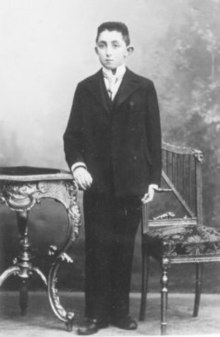Carl Ehrenstein
Carl Ehrenstein (born September 9, 1892 in Vienna , † January 10, 1971 in the London Borough of Bromley ) was an Austrian prose writer, poet and translator (from English and Danish).
Life
Carl was the younger brother of Albert Ehrenstein . He first lived in Vienna and Berlin and then, after an unsuccessful literary career, went to London at the end of the 1920s, where he first worked as a translator, then as a literary agent and finally as a bank clerk. He was married to Maude Pease, whom he met (like Albert, a follower and confidante of Alfred Adler , whom he still knew from the Viennese neighborhood) at the Adler Society in London. The relationship remained childless.
As a literary agent, he promoted the translation of German literature into English and English literature into German. With his positive reviews, Ehrenstein ensured the translation of Hans Fallada's works into English during the 1930s. He continued this activity after the Second World War , but remained unsuccessful with the English publisher Putnam with the suggestion that Fallada's work Everyone dies should also be translated into English for himself.
estate
The estate of Carl Ehrenstein is - like that of his brother Albert - in the National Library of Israel . It includes his correspondence, work notes, manuscripts and photographs.
Works
- Essays
in magazines Saturn , Schaubühne , Die Weißen Blätter , Wieland , Daimon , Vers and Prosa .
- Books
- A boy's complaints . 1913 (as volume 6 of the expressionist book series The Youngest Day ).
- Ask for love . 1921.
- The dump . 2005 (childhood memories from Vienna and Slovakia before 1900) ISBN 3-933077-19-2 .
- Translations
- Edgar Allan Poe : Gordon Pym
- Arnold Bennett : Teresa
- Sinclair Gluck : The Golden Panther
- Percival Christopher Wren : Blood Brotherhood (Beau Geste).
literature
- Ehrenstein, Carl. In: Lexicon of German-Jewish Authors . Volume 6: Dore – Fein. Edited by the Bibliographia Judaica archive. Saur, Munich 1998, ISBN 3-598-22686-1 , pp. 132-134.
Web links
- Literature by and about Carl Ehrenstein in the catalog of the German National Library
| personal data | |
|---|---|
| SURNAME | Ehrenstein, Carl |
| BRIEF DESCRIPTION | Austrian prose writer, poet and translator |
| DATE OF BIRTH | September 9, 1892 |
| PLACE OF BIRTH | Vienna |
| DATE OF DEATH | January 10, 1971 |
| Place of death | Bromley / Kent |
